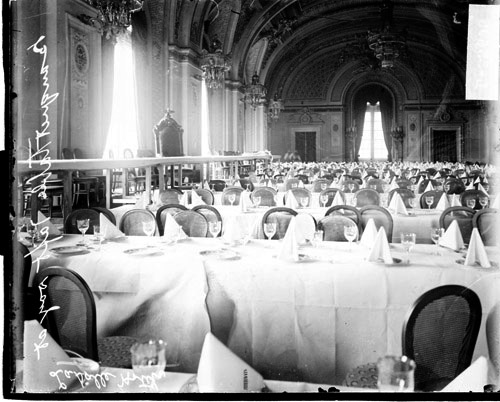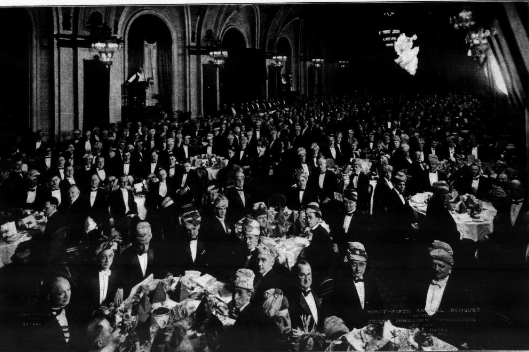
When Calvin Coolidge addressed the 45th annual banquet of the Chicago Jewelers’ Association (along with radio listeners across the country via national hookup) in the Ballroom of the La Salle Hotel on the evening of January 22, 1923, he had much to offer those listening, much that still strikes home one hundred years later. He said:
“It is not only as an industry but as an art that this trade today ministers to a fundamental requirement of all civilization. Its real mission is not to appeal to vanity or to provide the means of mere ostentation, but to give expression to the ennobling sentiment of a love of beauty which lies at the foundation of creative art. To provide the people with treasure in inspiring form is not to serve a bare desire for gain, but is to aid the cause of refinement, culture, and humanity. Such a purpose and such a service are worthy of the best that there is in mankind.
“Beyond its financial return, there ought to be a pride in every calling, a source of satisfaction in every commercial enterprise. The practice has developed in this country of attempting to measure business entirely in terms of money, and on that basis to set limits to its activity with little regard to the other elements which enter into its conduct. The results of commerce cannot be disposed of in so many ounces of silver and so many pennyweight of gold. The final sum, which represents the entire transaction, has to be cast up in the ledger of life. Commerce is not confined to dealing in commodities, it is a dealing with men. The important production of manufacture is not fabric, but character.
“It is this which gives warrant and meaning and life to commerce. Men have found little advantage, little progress, and little satisfaction in a life which only supplied their own wants from the products of the field. It was only when they began to produce to supply the wants of others, when there became an exchange, not only of commodities but of ideas, that there began to rise of that civilized society which found its nourishment and support in commerce.

“It is not from commerce that we derive our ideals, it is from religion, from education, from the aspirations of the soul; but, it is from commerce that there is derived the power to minister to these ideals and to carry them into effect…It is from this source that there has been provided the means for investigating the laws of nature, for the founding of universities, and the construction of schoolhouses, for the creation of literature, sculpture and painting, for the endowment of charitable institutions, and the building of places of religious worship.
“This is the real purpose and meaning of all the industrial activity of our nation. As a necessary and inevitable result, it is a broadening out of life, the raising of the standard of human existence which reaches to every hearthstone in the land. It is true that these great privileges may be ignored, that these great powers may be misused, that the possession of money, especially if it be too easily secured, may be used, not to create, but to destroy, not to ennoble but to debase. But the evidence is all about that this is not the purpose to which the stupendous resources of our country are devoted. Here and there are examples of wanton prodigality and dissipation, but they represent nothing save their own certain destruction, while the mass of wealth of the country, if not always successfully, is honestly and conscientiously used to give to the people of the nation a more abundant life. Men of the greatest wealth have dedicated their stupendous fortunes almost in their entirety in faith, in hope, and in prayer to this high calling…
“The large enterprises of our country have been created, almost without exception, not by men who were born to the purple, but those who came into life under very meagre circumstances. In a country where the measure of a man is not who he is but what he can do, this may not be of much importance, but it is one fact in the evidence which points to the inescapable conclusion that the makers and builders of America have been and are the people.

“It is not always true that those who perform a large public service meet with financial success, but it is true, almost without exception, that those who achieve great financial success do so by the performance of a great public service. It needs to be realized that they have worked with the people and through the people, and that the great instruments of commerce and industry which they have created are for the people. The service which they render can go on expanding to meet the ever-increasing needs of the people so long as it is profitable and no longer…Only a public enemy could wish to see it torn by dissension and discord and destroyed by envy and malice. Every well-wisher of our country — everyone desirous of the welfare of the people, wants to see it maintained, strengthened, and prosperous through more cooperation, better understanding, mutual forbearance, and good will. Unless this foundation is thoroughly established, all other efforts will be in vain.
“There is no more destructive agency in our national life than that which undertakes to arouse the jealousy of one section against another, to stir up dissension between employer and employed, promote unjustifiable discord between public service corporations and the communities which they serve, and generally to array one part of the productive and business life of the nation against another part. Of course, the blame for such a condition, when it arises, is never confined to one side. Generally, it has its basis in ignorance of the facts involved. Oftentimes there is too little frankness on the part of some charged with the management and too much suspicion on the part of some of the public. The business of the country is not conducted for the purpose of cheating the people. It could not be done even if some of its directors attempted it. Nor do the people wish to oppress anyone, to despoil anyone, or to have the use of property without rendering a just compensation. Nothing would so conduce to an increasing and profitable production, to adding to the welfare of the people, to advancing every art of civilization, as to be rid of all these quarrels and dissensions and work together in peace and harmony under the existence of mutual respect and confidence.”
